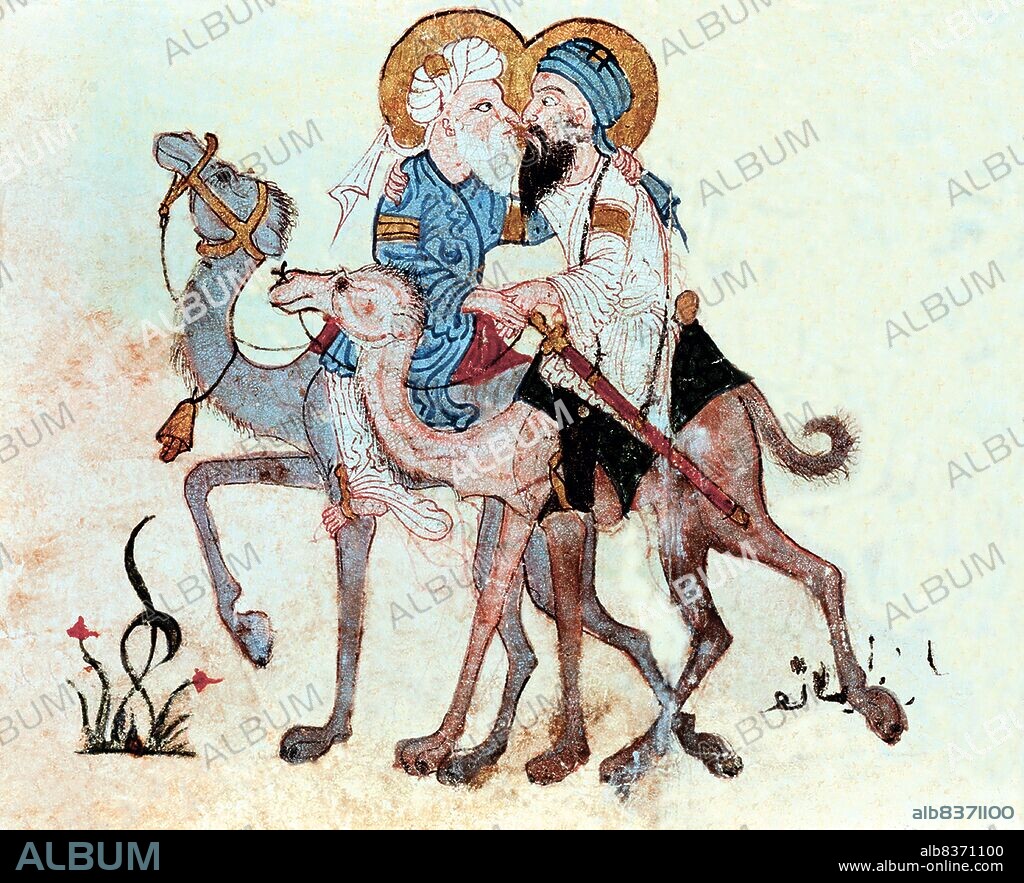alb8371100
Iraq: The farewells of Abu Zayd and Al-Harith before the return to Mecca, from al-Hariri's 'Maqama',1240 CE

|
Zu einem anderen Lightbox hinzufügen |
|
Zu einem anderen Lightbox hinzufügen |



Haben Sie bereits ein Konto? Anmelden
Sie haben kein Konto? Registrieren
Dieses Bild kaufen.
Nutzung auswählen:

Titel:
Iraq: The farewells of Abu Zayd and Al-Harith before the return to Mecca, from al-Hariri's 'Maqama',1240 CE
Untertitel:
Siehe automatische Übersetzung
The Maqama are a collection of picaresque Arabic tales written in the form of rhymed prose in which rhetorical extravagance is conspicuous. The style was invented in the 10th century by Badi al-Zaman al-Hamadhani and extended by Abu Muhammed al-Qasim ibn Ali al-Hariri of Basra the following century.
. The protagonists in the tales are invariably silver-tongued hustlers, especially the roguish Abu Zaid al-Saruji, who trick the narrator and who live on their wits and dazzle onlookers with displays of acrobatics, acting and by reciting poetry.
. The protagonists in the tales are invariably silver-tongued hustlers, especially the roguish Abu Zaid al-Saruji, who trick the narrator and who live on their wits and dazzle onlookers with displays of acrobatics, acting and by reciting poetry.
Bildnachweis:
Album / Universal Images Group / Pictures From History
Freigaben (Releases):
Model: Nein - Eigentum: Nein
Rechtefragen?
Rechtefragen?
Bildgröße:
4753 x 3852 px | 52.4 MB
Druckgröße:
40.2 x 32.6 cm | 15.8 x 12.8 in (300 dpi)
Schlüsselwörter:
ALTER ORIENT: MESOPOTAMIEN • ASIEN • ASIEN, KONTINENT • GEMAELDE • IRAK • ISLAM • ISLAMISCH • KAMEL • KAMELE • KOMMUNIKATION • KONTINENT, ASIEN • KUNST • LITERATUR • MALEREI • MESOPOTAMIEN • MOHAMMEDANER • MOHAMMEDANERIN • MOSLEM • MOSLEMIN • MUSLIM • MUSLIMIN • TRANSPORT • TRANSPORTE
 Pinterest
Pinterest Twitter
Twitter Facebook
Facebook Link kopieren
Link kopieren Email
Email
